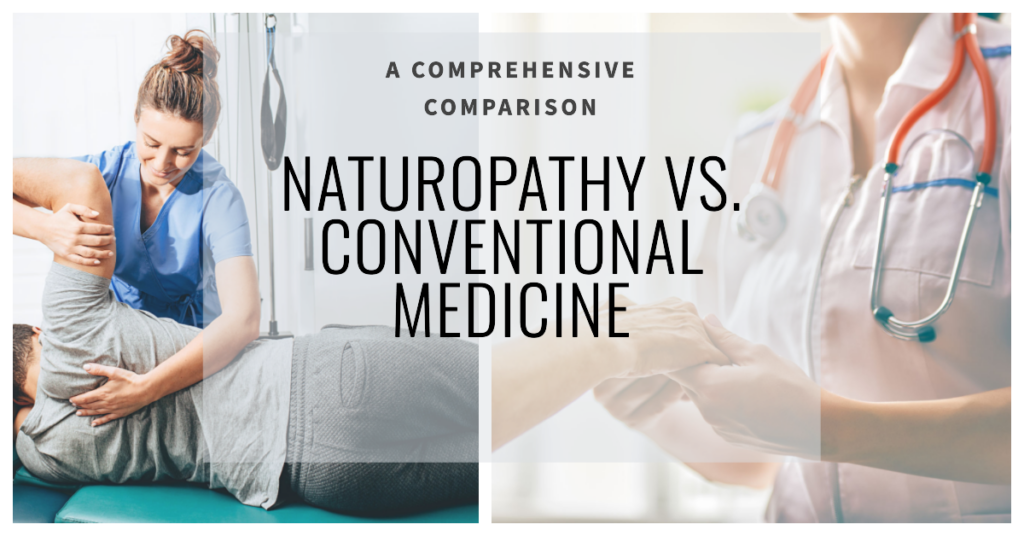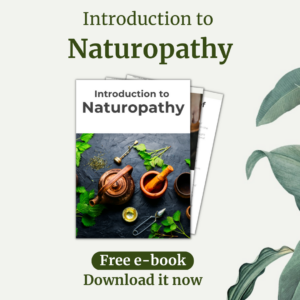Naturopathy vs. Conventional Medicine: A Comprehensive Comparison

In the modern era, individuals seeking healthcare have a wide range of options to choose from. Two of the most prominent approaches to healthcare are naturopathy and conventional medicine. While both aim to improve health and well-being, they differ in their philosophies, methodologies, and treatment options.
In this article, we will delve into the key differences between naturopathy and conventional medicine, explore the unique advantages of each approach, and provide information to help you make informed decisions about your health. Let’s explore the options now.
What is Naturopathy?
Naturopathy, also known as naturopathic medicine, is a holistic approach to healthcare that emphasizes the body’s innate ability to heal itself. It seeks to promote wellness and prevent illness by using natural therapies and treatments that work in harmony with the body’s natural processes.
Naturopathy is founded on several core principles, including the healing power of nature, treating the whole person, identifying and treating the root cause of illness, and emphasizing prevention. Naturopathic practitioners may use a variety of therapies, including herbal medicine, nutrition, acupuncture, homeopathy, and physical therapies.
To learn more about naturopathy, consider exploring the Introduction to Naturopathy course or enrolling in the Naturopathy Practitioner Training Course. If you’re a beginner you may want to also read our comprehensive full beginner’s guide.
What is Conventional Medicine?
Conventional medicine, also known as allopathic medicine or modern medicine, is the mainstream medical system practiced by medical doctors (MDs) and other healthcare professionals. It is based on scientific principles and evidence-based practices and focuses on the diagnosis and treatment of diseases and medical conditions.
Conventional medicine often uses pharmaceutical medications, surgery, and other medical interventions to manage symptoms and treat illnesses. It is highly effective in addressing acute and life-threatening conditions and relies on rigorous scientific research and clinical trials.
Principles of Naturopathic Medicine
Naturopathic medicine is grounded in a set of guiding principles that inform its holistic approach to healthcare. These principles reflect the philosophy of naturopathy and serve as the foundation for naturopathic practice. The core principles of naturopathic medicine include:
- The Healing Power of Nature (Vis Medicatrix Naturae): Naturopathic medicine recognizes the body’s inherent ability to heal itself. Naturopathic practitioners seek to support and enhance the body’s natural healing processes by using therapies that work in harmony with nature.
- First Do No Harm (Primum Non Nocere): Naturopaths are committed to using gentle, non-invasive treatments that minimize the risk of harm. They prioritize safe and effective therapies and avoid interventions that may cause adverse effects.
- Treat the Whole Person (Tolle Totum): Naturopathy takes a holistic approach to healthcare, considering the physical, mental, emotional, and spiritual aspects of an individual’s well-being. Naturopathic practitioners view the body as an interconnected system and address the complex interplay of factors that influence health.
- Identify and Treat the Cause (Tolle Causam): Rather than simply treating the symptoms of a disease, naturopathy aims to identify and address the root causes of illness. By addressing the underlying factors that contribute to disease, naturopathy seeks to provide long-lasting relief and prevent recurrence.
- Doctor as Teacher (Docere): Naturopathic practitioners view themselves as educators and partners in the healing process. They work collaboratively with patients to develop personalized treatment plans and empower them to take an active role in their own health and well-being.
- Prevention is the Best Cure (Praevenire): Naturopathy emphasizes the importance of prevention and encourages individuals to adopt healthy lifestyle choices that support overall wellness. Naturopathic practitioners provide guidance on nutrition, stress management, and other factors that contribute to optimal health.
These principles serve as the foundation of naturopathic medicine and guide naturopathic practitioners in their approach to healthcare. By adhering to these principles, naturopathy aims to promote wellness, prevent illness, and empower individuals to take control of their health and well-being.
To learn more about the principles of naturopathic medicine and explore the benefits of a holistic approach to healthcare, consider reading ‘uncover the principles of naturopathy‘.
Key Differences Between Naturopathy and Conventional Medicine
Approach to Health and Disease
- Naturopathy: Naturopathy takes a holistic approach to health, considering the physical, mental, emotional, and spiritual aspects of an individual’s well-being. It seeks to identify and address the root causes of illness and emphasizes prevention and wellness. Naturopathic practitioners view the body as an interconnected system and believe that imbalances in one area can impact overall health.
- Conventional Medicine: Conventional medicine primarily focuses on the diagnosis and treatment of specific diseases and medical conditions. It tends to address symptoms and manage illnesses using medications, surgery, and other interventions. Conventional medicine excels in acute care and emergency situations, where timely medical intervention is critical.
Treatment Options
- Naturopathy: Naturopathic treatments are typically natural, non-invasive, and personalized to the individual. Common therapies include herbal medicine, nutrition and dietary counseling, acupuncture, homeopathy, and physical therapies. Naturopaths aim to support the body’s natural healing processes and may also provide lifestyle counseling and stress management techniques.
- Conventional Medicine: Conventional medicine offers a wide range of treatment options, including pharmaceutical medications, surgery, radiation therapy, and medical devices. These treatments are often highly effective in managing symptoms and treating specific conditions. However, they may also carry risks and potential side effects.
Comparison of Naturopathic Medicine and Conventional Medicine
| Aspect | Naturopathic Medicine | Conventional Medicine |
|---|---|---|
| Approach | Holistic approach that considers the whole person and addresses root causes of illness. | Focuses on diagnosis and treatment of specific diseases. |
| Treatment Options | Natural and non-invasive therapies, such as herbal medicine, nutrition, and acupuncture. | Pharmaceutical medications, surgery, and medical interventions. |
| Role of Practitioner | Educator and partner in the healing process, empowering patients to take charge of their health. | Expert medical provider who diagnoses and prescribes treatments. |
| Evidence and Research | Grounded in traditional healing practices, empirical knowledge, and growing scientific research. | Evidence-based, relies on rigorous scientific research and clinical trials. |
Comparison of Naturopathic and Conventional Approaches to Common Health Concerns
| Health Concern | Naturopathic Approach | Conventional Approach |
|---|---|---|
| Chronic Pain | Uses natural therapies (e.g., acupuncture, herbal medicine) to alleviate pain and address root causes. | May prescribe pain medications, recommend physical therapy, or perform surgery. |
| Digestive Issues | Provides dietary recommendations, nutritional counseling, and herbal remedies to support digestion. | May prescribe medications (e.g., antacids, proton pump inhibitors) to manage symptoms. |
| Hormonal Imbalances | Utilizes herbal medicine, nutrition, and lifestyle counseling to balance hormones and support endocrine health. | May prescribe hormone replacement therapy or medications to regulate hormones. |
| Mental Health | Offers counseling, herbal medicine, and mind-body practices to promote mental wellness and reduce stress. | May prescribe psychiatric medications and recommend psychotherapy or counseling. |
| Women’s Health | Addresses women’s health concerns holistically with herbal medicine, nutrition, and lifestyle modifications. | May prescribe hormonal contraceptives, hormone replacement therapy, or other treatments. |
| Aging | Employs natural therapies and lifestyle counseling to support healthy aging and address age-related concerns. | May recommend preventive screenings, medications, and interventions for age-related conditions. |

Role of the Practitioner
- Naturopathy: Naturopathic practitioners view themselves as educators and partners in the healing process. They work collaboratively with patients to develop personalized treatment plans and empower them to take an active role in their health and well-being. Naturopaths emphasize patient education and encourage individuals to make informed choices about their health.
- Conventional Medicine: In conventional medicine, medical doctors and other healthcare professionals diagnose and treat illnesses based on established medical guidelines and protocols. They provide expert medical advice and prescribe treatments to manage symptoms and address specific health conditions. The relationship between the practitioner and patient is typically more hierarchical, with the doctor as the primary decision-maker.
Evidence and Research
- Naturopathy: Naturopathy is grounded in traditional healing practices and the belief in the body’s innate ability to heal. While there is a growing body of research supporting the effectiveness of certain naturopathic therapies, the evidence base for naturopathy as a whole is less extensive than that of conventional medicine. Naturopathy often draws on empirical knowledge and clinical experience.
- Conventional Medicine: Conventional medicine is evidence-based and relies on rigorous scientific research and clinical trials. Treatments and interventions are developed and tested through controlled studies, and their safety and efficacy are carefully evaluated. Conventional medicine adheres to established standards of care and regulatory oversight.
Advantages of Each Approach
Advantages of Naturopathy
- Holistic and individualized approach to health and wellness.
- Emphasis on prevention and addressing the root causes of illness.
- Use of natural and non-invasive therapies with fewer side effects.
- Focus on patient education and empowerment.
- Integration of traditional healing practices and modern scientific knowledge.
Advantages of Conventional Medicine
- Highly effective in diagnosing and treating acute and life-threatening conditions.
- Access to a wide range of medical interventions and technologies.
- Strong evidence base and adherence to scientific principles.
- Standardized protocols and guidelines for medical practice.
- Ability to provide emergency care and surgical interventions when needed.
YouTube Video: Introduction to Naturopathic Medicine
Here is a YouTube video that provides an introduction to naturopathic medicine and its principles.
Please note that the video is provided for informational purposes and should not be considered an endorsement of any specific practitioner or treatment.
Common Naturopathic Therapies and Their Benefits
| Therapy | Description | Potential Benefits |
|---|---|---|
| Herbal Medicine | The use of plants and plant extracts to support health and address various conditions. | Alleviates symptoms, reduces inflammation, boosts immunity |
| Nutrition and Diet | Personalized dietary recommendations and nutritional counseling to promote optimal health. | Improves digestion, supports weight management, enhances energy |
| Acupuncture | A technique that stimulates specific points on the body to balance energy flow and promote healing. | Reduces pain, relieves stress, improves sleep |
| Homeopathy | The use of highly diluted substances to stimulate the body’s healing response. | Promotes healing, addresses acute and chronic conditions |
| Physical Therapies | Techniques such as massage, hydrotherapy, and exercise to support physical health and well-being. | Increases mobility, reduces pain, improves circulation |
| Lifestyle Counseling | Guidance on stress management, sleep hygiene, and other lifestyle factors that impact health and wellness. | Enhances mental well-being, promotes healthy habits, reduces stress |
Naturopathic Medicine for Chronic Pain: A Holistic Approach to Pain Management
Chronic pain is a complex and multifaceted condition that can significantly impact an individual’s quality of life. Naturopathic medicine offers a holistic approach to pain management that addresses the underlying causes of pain and seeks to restore balance to the body.
Naturopathic practitioners may use a variety of natural therapies, including herbal medicine, acupuncture, physical therapies, and nutritional counseling, to alleviate pain and reduce inflammation. They also emphasize the importance of stress management, sleep hygiene, and emotional well-being in managing chronic pain.
By taking a comprehensive and individualized approach, naturopathy aims to empower individuals to manage their pain effectively and improve their overall well-being.
Naturopathic Medicine and Cancer: A Complementary Approach to Cancer Treatment
Cancer is a complex and multifaceted disease that requires a comprehensive and integrative approach to treatment. Naturopathic medicine can serve as a valuable complement to conventional cancer treatments, such as chemotherapy and radiation therapy.
Naturopathic practitioners work collaboratively with oncologists and other healthcare providers to develop personalized treatment plans that support the body’s natural healing processes and enhance the effectiveness of conventional treatments.
Common naturopathic therapies for cancer patients include herbal medicine, nutritional counseling, acupuncture, and mind-body practices. Naturopathy also emphasizes the importance of prevention and lifestyle modifications to reduce the risk of cancer recurrence and promote overall health.
Naturopathic Medicine for Mental Health: Taking a Holistic Approach to Mental Wellness
Mental health is an integral component of overall well-being, and naturopathic medicine offers a holistic approach to supporting mental wellness. Naturopathic practitioners recognize the interconnectedness of the mind and body and seek to address the root causes of mental health challenges, such as stress, nutritional deficiencies, hormonal imbalances, and environmental factors.
Naturopathic therapies for mental health may include herbal medicine, nutritional supplementation, counseling, and mind-body practices, such as meditation and relaxation techniques. By taking a comprehensive and individualized approach, naturopathy aims to promote mental resilience, reduce stress, and enhance emotional well-being.
Naturopathic Medicine for Women’s Health: Supporting Women’s Health Naturally
Women’s health encompasses a wide range of unique physiological and hormonal changes that occur throughout a woman’s life. Naturopathic medicine offers a natural and holistic approach to supporting women’s health, from menstruation and fertility to menopause and beyond. Naturopathic practitioners work collaboratively with women to develop personalized treatment plans that address their specific health needs and goals.
Common naturopathic therapies for women’s health include herbal medicine, nutritional counseling, acupuncture, and hormone balancing. Naturopathy also emphasizes the importance of self-care, stress management, and lifestyle modifications to support overall health and well-being.
Naturopathic Medicine and Aging: Healthy Aging with Naturopathic Medicine
Aging is a natural and inevitable process, but naturopathic medicine offers a proactive approach to healthy aging that emphasizes vitality, wellness, and quality of life. Naturopathic practitioners work with older adults to address age-related health concerns, such as chronic pain, cognitive decline, and metabolic imbalances, and to promote optimal health and well-being.
Naturopathic therapies for healthy aging may include herbal medicine, nutritional supplementation, physical therapies, and mind-body practices. Naturopathy also emphasizes the importance of prevention, lifestyle modifications, and social engagement in supporting healthy aging. By taking a holistic and individualized approach, naturopathy empowers older adults to age gracefully and maintain their independence and vitality.
Benefits of Naturopathic Medicine for Specific Health Concerns
| Health Concern | Potential Benefits of Naturopathic Medicine |
|---|---|
| Chronic Pain | Alleviates pain, reduces inflammation, improves mobility, and addresses underlying causes of pain. |
| Digestive Issues | Supports healthy digestion, alleviates symptoms, and addresses food sensitivities and nutritional imbalances. |
| Hormonal Imbalances | Balances hormones, alleviates symptoms, and supports reproductive and endocrine health. |
| Mental Health | Promotes mental resilience, reduces stress, enhances emotional well-being, and supports brain health. |
| Women’s Health | Addresses menstrual irregularities, supports fertility, eases menopausal symptoms, and promotes hormonal balance. |
| Aging | Supports healthy aging, enhances vitality, promotes cognitive function, and addresses age-related health concerns. |
Making Informed Decisions About Your Health
When it comes to your health, it’s important to make informed decisions based on your unique needs and circumstances. Both naturopathy and conventional medicine have their strengths and limitations, and each approach may be appropriate in different situations. Some individuals may choose to exclusively pursue one approach, while others may benefit from an integrative approach that combines the best of both worlds.
If you’re interested in exploring naturopathy, consider seeking care from a qualified naturopathic practitioner who is accredited by reputable organizations such as IPHM, CMA, or CPD. It’s also important to communicate openly with your healthcare providers and discuss any complementary therapies you’re considering.
Ultimately, the goal is to find a healthcare approach that aligns with your values, supports your well-being, and empowers you to live a healthy and fulfilling life.
Conclusion
Naturopathy and conventional medicine represent distinct approaches to healthcare, each with its own philosophy, methodologies, and treatment options. By understanding the key differences between these approaches, you can make informed decisions about your health and explore the options that resonate with you. Whether you’re drawn to the holistic principles of naturopathy or the evidence-based practices of conventional medicine, the journey to health and wellness is a deeply personal one. Take the time to explore, learn, and discover the path that feels right for you.
FAQs
- What is naturopathic medicine? Naturopathic medicine is a holistic approach to healthcare that emphasizes the body’s innate ability to heal itself. It uses natural therapies and treatments to support overall wellness and address the root causes of illness.
- How is naturopathic medicine different from conventional medicine? Naturopathic medicine takes a holistic approach to health, considering the whole person and addressing the underlying causes of illness. It uses natural and non-invasive therapies. Conventional medicine focuses on diagnosing and treating specific diseases using pharmaceutical medications, surgery, and other medical interventions.
- What conditions can naturopathic medicine treat? Naturopathic medicine can address a wide range of acute and chronic conditions, including digestive issues, hormonal imbalances, chronic pain, mental health challenges, and more. It also emphasizes prevention and overall wellness.
- Is naturopathic medicine safe? Naturopathic medicine uses natural and non-invasive therapies that generally have fewer side effects than conventional medical treatments. However, it’s important to work with a qualified naturopathic practitioner who is trained in the safe and effective use of these therapies. Always inform your healthcare providers about any complementary therapies you are using.
- Can naturopathic medicine be used alongside conventional medicine? Yes, naturopathic medicine can be used as a complementary approach alongside conventional medical treatments. Many individuals find that combining the best of both approaches enhances their overall health and well-being. It’s important to communicate openly with all of your healthcare providers to ensure coordinated and integrated care.
- How do I find a qualified naturopathic practitioner? To find a qualified naturopathic practitioner, look for practitioners who have completed accredited training in naturopathic medicine and are licensed or registered with a professional naturopathic association. You can also ask for recommendations from your healthcare provider or seek referrals from trusted sources.
- What should I expect during a naturopathic consultation? During a naturopathic consultation, the practitioner will take a detailed health history, ask about your symptoms and lifestyle, and conduct a physical examination if necessary. They may also order laboratory tests to gather additional information. The practitioner will work with you to develop a personalized treatment plan that addresses your specific health needs and goals. The plan may include dietary recommendations, herbal remedies, lifestyle modifications, and other natural therapies.
- Can naturopathic medicine help with chronic pain? Naturopathic medicine offers a holistic approach to managing chronic pain that addresses the underlying causes and supports the body’s natural healing processes. Common naturopathic therapies for chronic pain include acupuncture, herbal medicine, physical therapies, and nutritional counseling. Naturopathic practitioners also emphasize the importance of stress management and emotional well-being in managing pain.
- Can naturopathic medicine support mental health? Naturopathic medicine takes a holistic approach to mental health and wellness. Naturopathic practitioners may use herbal medicine, nutritional supplementation, counseling, and mind-body practices to promote mental resilience, reduce stress, and enhance emotional well-being. They also recognize the interconnectedness of the mind and body and address any physical imbalances that may be impacting mental health.
- Is naturopathic medicine suitable for all ages? Naturopathic medicine is suitable for individuals of all ages, from infants to older adults. Naturopathic practitioners tailor their treatment recommendations to meet the specific needs and health goals of each individual, taking into account their age, medical history, and overall well-being.













Responses